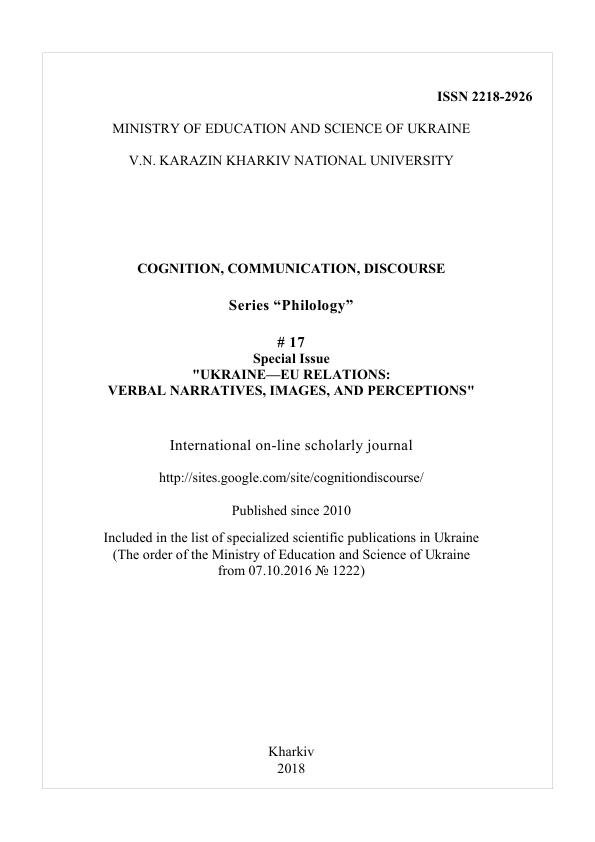East-West dichotomy in the context of Ukrainian conflict resolution
Abstract
This article analyses the contrasting images of the West and the East in the conflict narrative in Ukraine: Where is the imaginary line that divides them? Which countries constitute the ‘East’ and which the ‘West’? and How does the Russia-Ukraine conflict affect the perceived division? This article is informed by Edward Said’s hypothesis of orientalism, specifically that Western knowledge of the Eastern world(s) carries a negative connotation. Testing this hypothesis on the materials of elite interviews conducted in Ukraine in 2017, the article ‘maps’ the image of the world from a Ukrainian point of view. It explores if an internalized ‘othering’ may be present within Ukraine’s borders due to the ongoing conflict in the East. The findings, however, disprove this assumption. Results show that there is a perceived sense of closeness between Ukraine and Eastern European countries due to historical and cultural ties as well as modern day partnership. Relations with Russia were perceived as ambiguous despite the armed conflict in the East and the annexation of Crimea. There is also no evidence for “othering of Eastern vis-à-vis Western regions inside Ukraine.
Downloads
References
Besier, G., & Stokłosa, K. (2017). Neighbourhood Perceptions of the Ukraine Crisis: From the Soviet Union into Eurasia? Abingdon: Routledge.
Bideleux, R., Jeffries, I. (2007). A History of Eastern Europe: Crisis and Change. London: Routledge.
Black, J. L., Johns, M., & Theriault, A. (2016). The Return of the Cold War: Ukraine, the West and Russia. London; New York, NY: Routledge/Taylor & Francis Group.
“Crisis, Conflict and Critical Diplomacy: EU Perceptions in Ukraine, Israel and Palestine (C3EU).” Jean Monnet Actions New Zealand, 29 Nov. 2018, Available from: http://jeanmonnet.nz/c3eu/.
Davies, N. (2006). Europe East and West. London: Jonathan Cape.
Forchtner, B. (2014). Historia Magistra Vitae: The Topos of History as a Teacher in Public Struggles over Self and Other Representation. In C. Hart & P. Cap (eds.). Contemporary Critical Discourse studies. London: Bloomsbury, 19-45.
Gritsay E., & Nikolko M. (2009). Ukraina: natsional’naya identichnost’ v zerkale Drugogo. [Ukraine: national identity in the mirror of the Other] Vilnius: EGU (in Russian).
Hahn, G.M. (2017). Ukraine Over the Edge: Russia, the West and the New Cold War. Jefferson, NC: McFarland.
Huntington, S. P. (1993). The Clash of Civilizations? In Foreign Affairs, Vol. 72 (3), 22-49.
Katchanovski, I. (2016). The Far Right in Ukraine During the 'Euromaidan' and the War in Donbas. Proceedings from Conference: Annual Meeting of the American Political Science Association, Philadelphia, September 1-4, 2016, Available from: http://dx.doi.org/10.2139/ssrn.2832203
Kolstø, P., & Blakkisrud, H. (2018). Russia before and after Crimea: Nationalism and identity 2010-17. Edinburgh: Edinburgh University Press.
Menon, R., & Rumer, E. (2015). Conflict in Ukraine: The Unwinding of the Post-Cold War Order. Cambridge: MIT Press.
Olchawa, M. (2017). Mission Ukraine: The 2012-2013 diplomatic effort to secure ties with Europe. Jefferson, NC: McFarlan.
Petrovic, T. (2013). Mirroring Europe: Ideas of Europe and Europeanization in Balkan Societies. Leiden: Brill.
Pittaway, M. (2003) Europe’s Borders, Europe’s Regions: Eastern Europe, Central Europe. In The Fluid Borders of Europe. Milton Keynes: Open University Worldwide.
Portnov, A. (2013). Memory Wars in Post-Soviet Ukraine (1991-2010). In Memory and Theory in Eastern Europe. New York: Palgrave Macmillan, 233-254.
Said, E. W. (1978). Orientalism. London: Penguin.
Tarasenko V.I., & Ivanenko O.O. (2004). Problema sotsial'noyi identyfikatsiyi ukrayins'koho suspil'stva (sotsiotekhnolohichna paradyhma) [The problem of social identification of Ukrainian society (sociotechnological paradigm)]. Kyiv: Instytut sotsiolohiyi NAN Ukrayiny - Institute of Sociology, NAS of Ukraine (in Ukrainian)
Todorova, M. (2009). Imagining the Balkans. Oxford: Oxford University Press.
Merry, E., Wood, E., Pomeranz, W., & Trudolyubov, M. (2016). The Origins of Russia’s War in Ukraine: The Clash of Russian and European “Civilizational Choices” for Ukraine. In Roots of Russia's War in Ukraine. New York, NY: Columbia University Press, 27-50.
Wolff, L. (1994). Inventing Eastern Europe: the Map of Civilization on the Mind of the Enlightenment. Stanford: Stanford University Press.
Yavorska, H., Bohomolov, O. (2010). Nepevnyi obyekt bazhannya: Yevropa v ukrayinsʹkomu politychnomu dyskursi [An Uncertain Object of Desire: Europe in Ukrainian Political Discourse]. Kyiv: Dmytro Burago Publ. and A. Krymskyi Institute of Oriental Studies of the National Academy of Sciences of Ukraine (in Ukrainian).
Authors, who publish with this journal, accept the following conditions:
The authors reserve the copyright of their work and transfer to the journal the right of the first publication of this work under the terms of the Creative Commons Attribution License (CC BY), which allows other persons to freely distribute a published work with mandatory reference to the authors of the original work and the first publication of the work in this journal.
Authors have the right to enter into separate additional agreements for the non-exclusive dissemination of the work in the form in which it was published by this journal (for example, to post the work in the electronic institutions' repository or to publish as part of a monograph), provided that the link to the first publication of the work in this journal is given.
The journal policy allows and encourages the authors to place the manuscripts on the Internet (for example, in the institutions' repositories or on personal websites), both before the presentation of this manuscript to the editorial board and during review procedure, as it contributes to the creation of productive scientific discussion and positively affects the efficiency and dynamics of citing the published work (see The Effect of Open Access).




